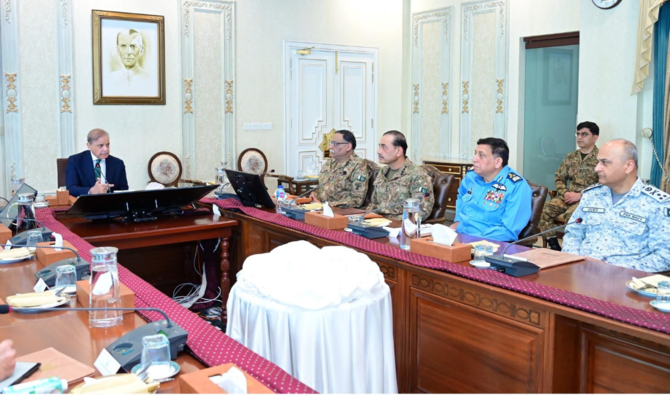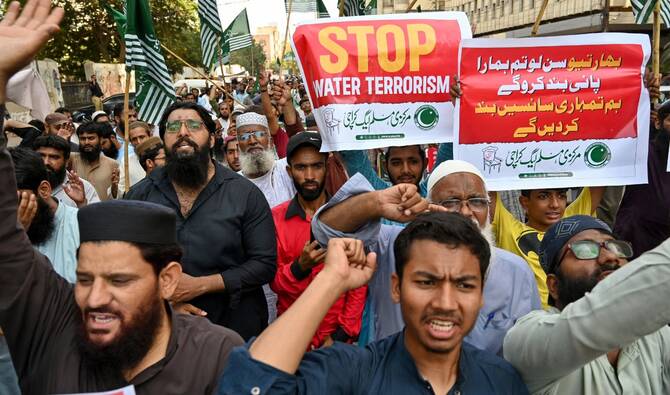ISLAMABAD: Religio-political parties are expected to fill a “political vacuum,” stemming from a crackdown on former prime minister Imran Khan’s party, and perform better in the upcoming general election scheduled for February 8, political analysts said this week.
Khan, who was ousted from power in a parliamentary no-trust vote, was briefly arrested in a graft case on May 9, 2023. His detention sparked violent demonstrations across the country, with his supporters ransacking government and military installations and torching public property. The attacks prompted a crackdown on Khan’s Pakistan Tehreek-e-Insaf (PTI) party, which saw several senior figures defect, be arrested or driven underground.
The ex-premier, who is in jail since August after being convicted in another graft case, alleges Pakistan’s powerful military and the caretaker government are colluding with dynastic parties that have long dominated the country to crush his movement and prevent him from running for office. The government and the military deny it.
Khan’s incarceration and disintegration of his party has led to a political vacuum in the South Asian country, which analysts believe is likely to be filled by religious parties.
“The vote bank of religious political parties is expected to increase in this election in the wake of crackdown against PTI,” Sabookh Syed, an expert on religio-political parties, told Arab News. “But this is yet to be seen if an increase in their votes will ultimately translate into an increase of seats as well.”
There are around 23 religious parties out of a total of 175 registered political parties in Pakistan, but their standing in elections has been weak as compared to mainstream political groups. Historically, these parties, especially the Jamat-e-Islami and the Jamiat Ulema-e-Islam (JUI), have performed well, when they forged electoral alliances with other major parties.
In the 2018 general election, at least 12 religio-political parties participated in the polls and secured 5.2 million of the total 54.3 million votes polled across the country. The Muttahida Majlis-e-Amal, an alliance of religio-political parties that also included the JUI and the JI, secured 12 National Assembly seats by bagging 2.5 million votes.
Unlike the past, Syed noted, religious parties have forged no electoral alliance for this election, while they still enjoy a significant support in certain areas, including southern parts of Khyber Pakhtunkhwa, southern Punjab and rural areas of Sindh and Balochistan provinces.
“Religious parties have historically never performed well in electoral politics in terms of number of seats, but have played a crucial role in forming governments,” he said.
For the upcoming election, the JUI of Maulana Fazlur Rehman and the Sirajul Haq-led JI are campaigning to capture the religious vote bank without forming an alliance of religious parties, though they are negotiating with other political parties for seat adjustments in different areas.
The religious vote bank is scattered across the country, therefore the votes of religious parties hardly translate into electoral seats, according to Zaigham Khan, a political analyst.
These parties secured a significant number of seats in national and provincial assemblies, when they forged electoral alliances with major political parties in the 2002 and 2013 elections.
“The position of these parties relatively appears better in this election due to the overall political environment,” Khan said, adding the JI may perform better in Karachi and KP, if it goes for seat adjustment with Khan’s PTI.
Likewise, he said, the JUI can perform well in KP and Balochistan, if it forms an electoral alliance with other major political parties, like the Pakistan Muslim League-Nawaz (PML-N) and the Pakistan Peoples Party (PPP).
Another religious party, the Tehreek-e-Labbaik Pakistan (TLP), secured around 5 percent of votes polled in 2018 election, but it could only grab two provincial assembly seats from Karachi.
The TLP’s vote bank could increase further in this election, according to Khan.
“The vote bank of TLP may increase a bit in this election due to an expected political vacuum, but they are not expected to give any setback to other major parties,” he said.





















